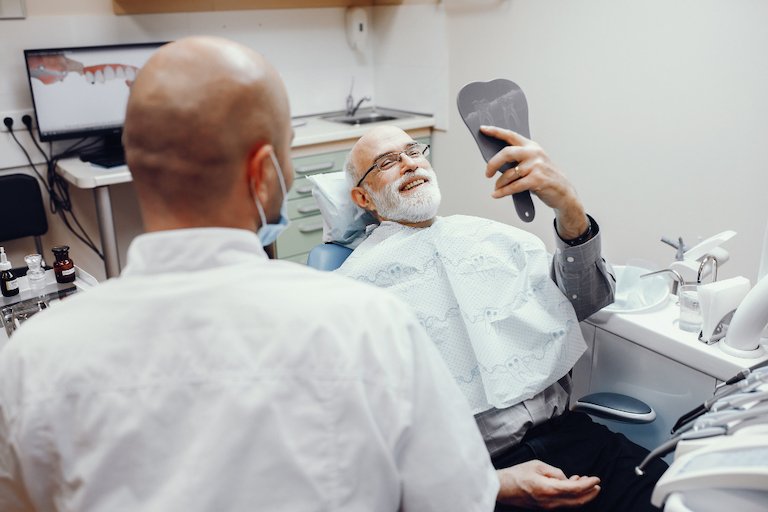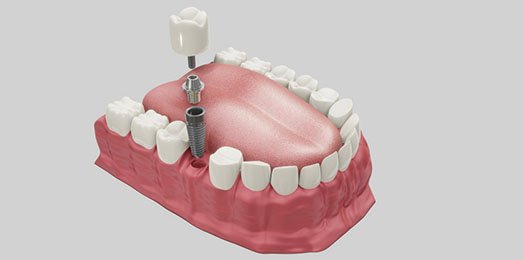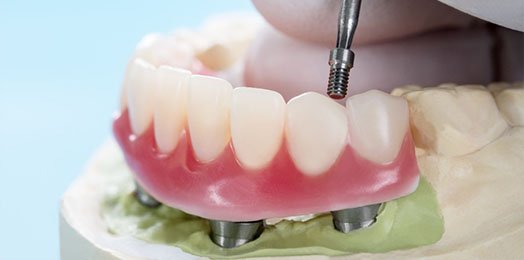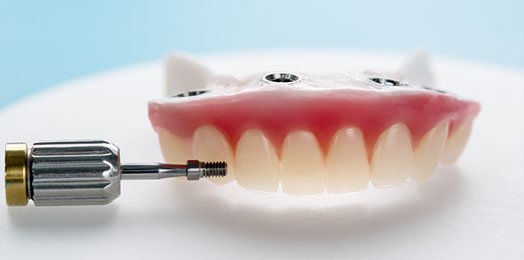Dental Implants
The Most Effective Dental Restoration

Dental Implants Melbourne CBD
Has your dentist told you that you would need dental implants?
Are you overwhelmed of all of the choices?
Well, maybe this can make choosing a little easier.
Read on to learn about the different types of dental implants available and your implant options.
Types of Dental Implants in Melbourne CBD

Single Implant
Dental implants are artificial tooth roots usually made from titanium that are surgically placed into your jawbone.
Using this implant, your Melbourne CBD dentist can attach an artificial tooth in place.
Mini Dental Implants
These are toothpick-sized implants that are extremely narrow. Their primary use is to stabilise a lower denture.
They are less innovative than the others, but still an acceptable option for you to look into.


All-On-4 Dental Implants
All-On-4 Dental Implants are used as an alternative for placing a full set of top or bottom restorations.
Four dental implants are surgically placed into the jawbone; this does away with the need for bone grafting.
A temporary set of replacement teeth can be installed the same day.
The Dental Implantation Procedure
Placing the Dental Implant
During dental implant surgery, your Melbourne CBD dentist makes a cut to open your gum and expose the bone. Holes are drilled into the bone where the dental implant metal post will be placed. Since the post will serve as the tooth root, it’s implanted deep into the bone. At this point, you’ll still have a gap where your tooth is missing. A temporary, partial denture can typically be inserted for aesthetic purposes. When cleaning or sleeping, you can take out this denture.
Enhancing Healing with PRF (Platelet-Rich Fibrin)
We use Platelet-Rich Fibrin (PRF) in our dental implant procedures to accelerate healing and improve osseointegration. Your blood naturally contains PRF, which is high in growth factors that promote tissue regeneration.
We draw a small amount of blood in our practice and process it using our centrifuge to create PRF. This fibrin-rich matrix is then applied to the implant site, promoting faster soft tissue healing, reducing inflammation, and improving the integration of the implant with your jawbone.
Waiting for Bone Growth
Osteointegration (pronounced oss-ee-oh-in-tuh-GRAY-shun) starts when the metal implant post is inserted into your jawbone. The jawbone develops into and joins the surface of the dental implant throughout this procedure. Like how roots support your real teeth, this procedure, which may take up to six months, helps give your new artificial tooth a strong foundation. PRF aids in this critical phase by stimulating cell regeneration and reducing healing time.
Placing the Abutment
When osseointegration is complete, you may need additional surgery to place the abutment — the piece where the crown will eventually attach. This minor surgery is typically done with local anaesthesia in an outpatient setting.
To place the abutment:
- Your Melbourne CBD dentist reopens your gum to expose the dental implant
- The abutment is attached to the dental implant
- The gum tissue is then closed around, but not over, the abutment
In many cases, the abutment is attached to the dental implant metal post when the post is implanted. That means you won’t need an extra surgical step.
Choosing Your New Artificial Teeth
After the abutment is placed, your gums must heal for one or two weeks before the artificial tooth can be attached. Once the gums heal, you’ll have more impressions made of your mouth and remaining teeth.
These impressions are used to make the crown — your realistic-looking artificial tooth. The crown can’t be placed until your jawbone is strong enough to support the use of the new tooth.
You and your dental professional can choose from two main types of artificial teeth:
A removable implant prosthesis
A traditional removable denture is comparable to this kind. The artificial white teeth are encased in pink plastic gum. Mounted on a metal frame fastened to the implant abutment, it snaps firmly into position.
It is simple to remove for daily cleaning or repairs. Replacing several teeth in the lower jaw is frequently viable because it’s more stable than a typical denture and less expensive than several separate dental implants.
A fixed implant prosthesis
A single implant abutment is firmly cemented or screwed into an artificial tooth of this type. You cannot take the tooth out to clean it or to sleep.
This method can replace multiple lost teeth if cost is not an issue. Every crown has its dental implant attached to it.

After Surgery
Whether you have dental implant surgery in one stage or multiple stages, you may experience some of the typical discomforts associated with any type of dental surgery, such as:
- Swelling of your gums and face
- Bruising of your skin and gums
- Pain at the implant site
- Minor bleeding
Using PRF in our procedures helps reduce post-surgical discomfort, speeds healing, and lowers the risk of complications such as infection or implant failure.
After each stage of surgery, you may need to eat soft foods while the surgical site heals.
Dental Implants in Melbourne CBD
Finding your perfect smile shouldn’t be difficult.
There are many different types of dental implants out there for you to choose from.
Your Melbourne CBD dentist at Art De Dente will work closely with you to find the perfect match for you. Our use of PRF in dental implant placement ensures optimal healing and a smooth recovery process.
Call us or request an appointment online.
We are located at Level 17, 190 Queen Street in Melbourne CBD.
Frequently Asked Questions
How do dental implants work?
Dental implants replace the whole structure of your missing tooth: that is, its visible portion as well as the supportive root.
Am I a candidate for dental implants?
What are alternative options to dental implants?
Alternative options for dental implants include the traditional crown and bridge or non-implant retained dentures and partials.
What does the dental implants consult involve?
The cost for comprehensive consultation is $200.00 and the duration would be 40 minutes or more.
Depending upon the case, the practice may include OPG/ CBCT as part of the consultation at no extra cost.
If copies of the imaging and clinical notes have to be provided to the client then a records preparation and transfer fee of $35.00 will have to be paid.
